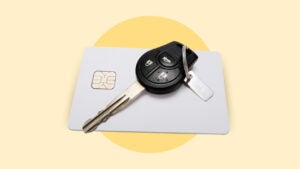Is it illegal to use a business credit card for personal expenses?

Key takeaways
- Using a business credit card for personal purchases isn’t technically illegal, but could violate the terms and conditions of your card agreement, which has consequences.
- These can include the closure of your account, personal liability, tax implications, more complicated bookkeeping and a negative impact on your personal and business credit.
- If you accidentally charge a personal expense on your business card, notify relevant parties and flag the charge so it’s not included in your business accounting.
Business credit cards are powerful tools for managing the ongoing expenses involved in running a business: supplies to purchase, vendors to pay and operational costs to handle.
Sometimes, in the hustle of trying to take care of things, the lines between your business and personal life can blur. So, what happens if you take care of some personal shopping on your business credit card?
Putting your personal purchases on your business credit card technically isn’t illegal. However, making personal purchases on a business credit card likely violates the terms and conditions of your card agreement, which can come with serious consequences.
Though it’s best to keep personal and business expenses separate, here’s what you need to know if you accidentally charge a personal purchase on your business card.
Consequences of using your business card for personal expenses
Getting a business credit card can often be easier than getting a consumer credit card. Even if your business isn’t registered or fully up and running yet, you may still qualify for a business card. And while it may be tempting to use a business credit card for all of your expenses, it’s important to charge only business expenses on your business card.
Mixing business expenses with personal expenses complicates your expenditures on a few different levels. Aside from creating accounting headaches, you’re also taking away funds meant to help your business thrive and muddying the waters if you’re trying to build business credit.
Using a business card for personal expenses can also result in problems with your account and has the potential to negatively affect your ability to get credit in the future.
Your account may be closed
When you’re approved for a business credit card, you agree to the terms and conditions that come along with using your account. Most business credit card providers require you to agree not to use the card for personal expenses. If you break this rule, they have the right to cancel your card.
For example, terms and conditions for the Ink Business Cash® Credit Card state: “By becoming a Visa Business Card cardmember, you agree that the card is being used only for business purposes and that the card is being issued to a public or private company including a sole proprietor or employees or contractors of an organization.”
The terms and conditions for The Business Platinum Card® from American Express are similar, stating in all caps:
By submitting this application, you … are REPRESENTING THAT ALL CARD(S) ISSUED ON THE ACCOUNT WILL ONLY BE USED FOR COMMERCIAL OR BUSINESS PURPOSES.
If your card issuer notices patterns in your expenses outside of normal business spending, it could send a red flag. When you use your business credit card for personal spending, you are going against the contract terms for the card, which are grounds to close your account.
You may become personally liable
Mixing your personal and business finances could end up making you personally liable for any business debt if your business runs into legal trouble.
“Commingling your personal and business funds presents a risk because it can allow courts to pierce the corporate veil and hold you personally liable for your business’ liabilities,” says Greg Mahnken, a former credit industry analyst.
Most credit card issuers require you to sign a personal guarantee before approving a business credit card. Mahnken says that, because of this guarantee, “you’re almost certainly legally liable for your business credit card’s balance, so charging large personal purchases to a business credit card poses the same threat as charging large business expenses.” Adding personal expenses to a business card is not worth the liability risk.
Purchases will have limited consumer protections
You may lose protection on certain purchases you would have had if you’d used a personal credit card. That’s because business credit cards are not regulated by the same laws as consumer credit cards.
Many of the protections from the Credit Card Accountability Responsibility and Disclosure Act (CARD Act) don’t apply to business credit cards, including:
- Prevention against raising interest rates without notice
- Prohibition of interest rate increases on existing balances
- Prohibition of interest charges on debt paid on time
- Application of payment to highest interest rate charges first
Another concern when making purchases with a business credit card is that you could have more difficulty disputing charges. Luckily, the time frame to dispute a charge is longer than that of a personal credit card. You’ll also likely have fewer protections against how debt collectors choose to handle collection.
Both your personal and business credit scores will be affected
You may be tempted to use your business credit card for personal purchases to help build up your consumer credit score. While this might sound like a good idea on the surface, it probably won’t yield the result you’re looking for. This is because most business credit cards only report to business credit bureaus. Any gains you make on your business credit score likely won’t transfer to your consumer credit score.
However, if you’re putting personal expenses on your business credit card and can’t pay them off, your personal credit score may take a hit. This is because of the personal guarantee you sign before receiving your business credit card. “If you can’t pay off your balance, your personal credit will likely suffer,” says Mahnken.
You’ll pay more in the long term
Business credit cards usually come with higher fees and higher interest rates. The trade-off for these higher rates is that most interest and fees for business purchases are tax-deductible, along with the business expenses themselves.
Personal purchases, however, are not tax-deductible, which means you will have no return on them. So, if you make personal purchases with your business credit card and maintain a balance, they will cost you more in the long term.
It’s harder to track business expenses
Tracking your business expenses helps you understand where your business is growing and where it might be losing money. Doing so also gives you an idea of your main expenditures and places where you can cut costs.
When you add personal expenses and business expenses to the same card, it becomes harder to understand the needs of your business and its overall financial health.
“Even if you try filtering them out, your personal expenses can skew your business reports and make it very difficult to see how well (or poorly) your business is doing,” says tax advisor Michael Eckstein.
Reliable recordkeeping is also important when you’re applying for business funds, whether it’s a loan, grant or line of business credit. If your personal finances are mixed in with your business finances, you can have difficulty getting funding — and may not be able to do so until you’ve cleaned up your accounts.
Your taxes will be more complicated
Most business expenses are tax-deductible. Personal expenses are not. Mixing the two makes it complicated to file your taxes and can cause even deeper problems if the IRS ever chooses to audit you.
Let’s say you take a business trip that also includes a family vacation. During that time, you charge several dinners on your business credit card. Some of those dinners are with clients, and some are with family. When it comes time to document your expenses, it may be difficult to tell the dinners apart.
Your credit card company may not be able to catch any mistakes, but the IRS is more meticulous. And if your expenses are audited after filing, you may end up paying fines or even back taxes.
What if you accidentally use a business credit card for personal expenses?
Accidents happen, and you can repair the damage. For starters, make sure you flag the personal purchase so that it’s not included in bookkeeping for your business.
Next, be sure to pay off the personal expense as soon as possible so that it doesn’t take away from your available credit balance for your business. If you aren’t the sole proprietor of the business, you’ll also need to consider how to report the mistake to the necessary people or teams in the business.
The bottom line
Charging personal expenses on your business credit card isn’t against the law, but it’s likely against the terms of your credit card agreement. The consequences of this can include the closure of your account, personal liability, tax implications, more complicated bookkeeping and a negative impact on both your personal and business credit, as well as the potential for higher interest charges.
If you inadvertently charge something personal on your business card, take steps to notify the relevant parties. And be sure to flag it so that it’s not included in your business accounting.
Why we ask for feedback Your feedback helps us improve our content and services. It takes less than a minute to complete.
Your responses are anonymous and will only be used for improving our website.
You may also like

Where to get a bad credit business loan





